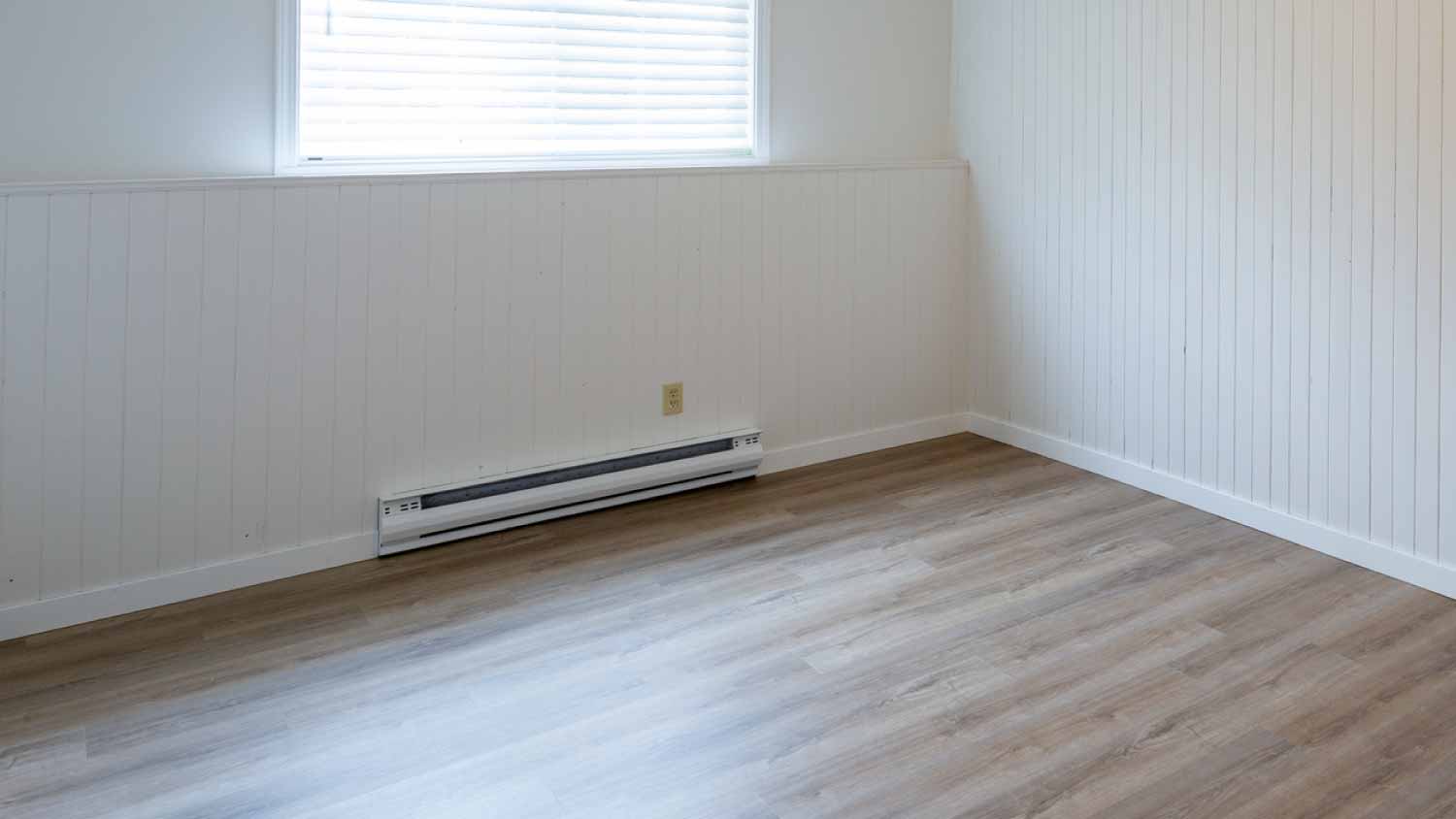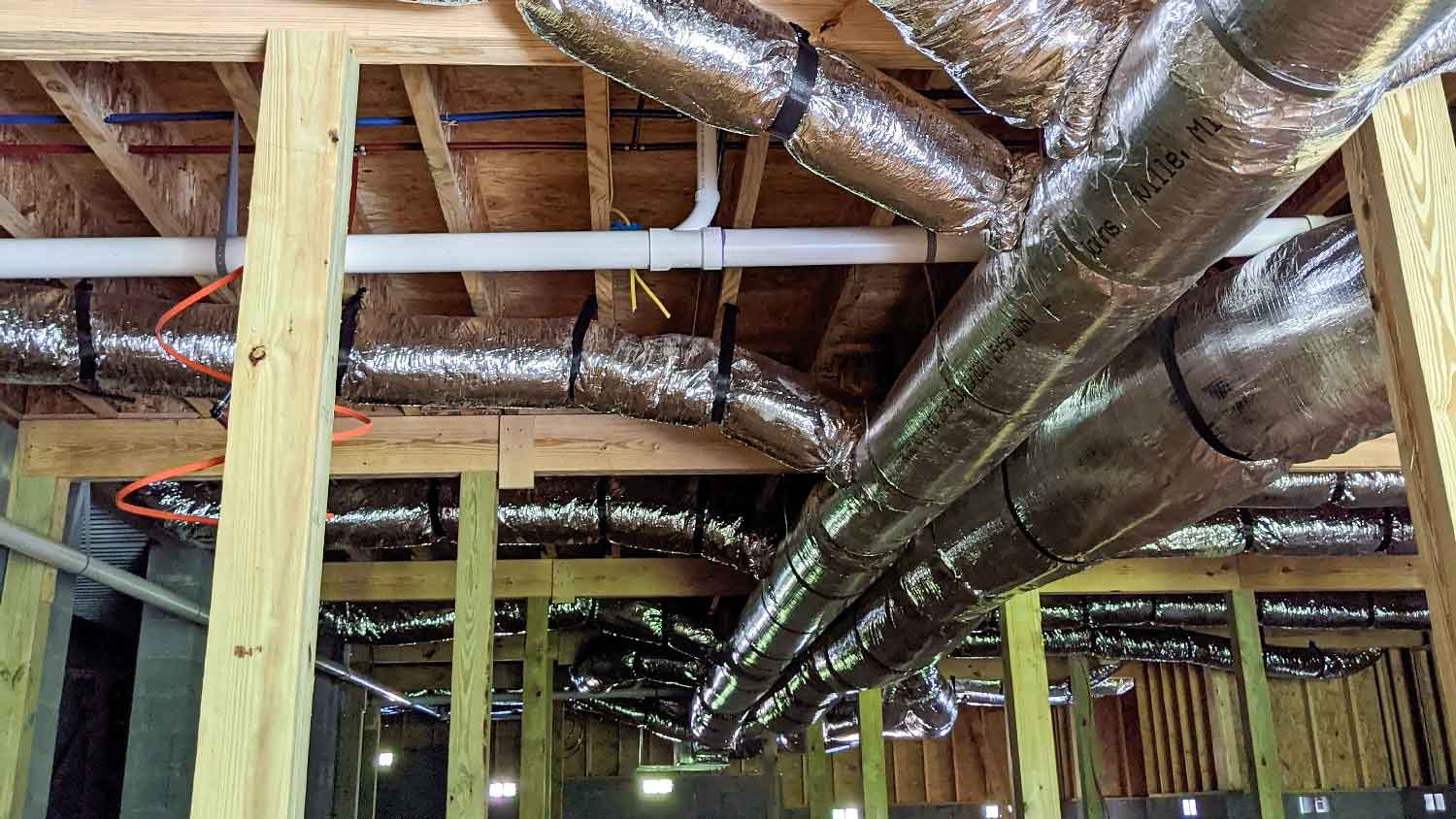
Springing for HVAC maintenance costs may seem like an extra—and easy-to-ignore—item on your checklist, but it will save you money in the long run.
Decide between these two ductless heating solutions


Baseboard heaters integrate seamlessly with a home’s baseboards, while space heaters are freestanding heating devices.
Baseboard heaters have a higher initial cost than space heaters.
Baseboard heaters cost less to run than space heaters.
Baseboard heaters require professional installation and space heaters do not.
Whether you're upgrading your home’s heating system or looking for a quick and effective heating solution, baseboard heaters and space heaters are two great options that don’t require a complex ductwork set-up. Each heating method has its own unique strengths and limitations, which can impact your comfort as well as your wallet. We’ll break down the key differences to help you choose between a baseboard heater vs. space heater for your home.

Baseboard heaters deliver steady, even warmth across the entire room through convection heating the air near the floor. On the other hand, space heaters are portable electric heating devices designed to provide targeted heat to smaller areas. The key difference is that baseboard heaters excel at providing consistent warmth in a set location, whereas space heaters are more suitable for quick temporary heating in smaller enclosed spaces.

Baseboard heaters are fixed heating units installed along the baseboards of the walls in a room. These heaters use convection heating to circulate warm air throughout the space. They are most commonly powered by electricity, but they can also run on hot water or steam in hydronic systems. You’ll need to hire a local baseboard installer to place this type of heating system in your home safely and efficiently.
| Pros | Cons |
|---|---|
| Provides steady, even heat | Warms room slowly |
| Energy efficient | Higher installation cost |
| Silent operation | Requires professional installation |
Best for:
Rooms that need steady, consistent heating
Areas requiring quiet heating, such as bedrooms and offices
Homeowners seeking a permanent heating solution
Baseboard heaters are designed to maintain a steady, even temperature throughout a room. Since they warm the air close to the floor and allow it to rise naturally, they help to evenly distribute heat without creating hot or cold spots, making them ideal for maintaining steady warm temperatures throughout a living space.
Another advantage of baseboard heaters is their quiet operation. Since they don’t have fans, they operate silently, making them a great option for spaces where noise could be a distraction, such as bedrooms, offices, or libraries.
One of the main downsides of baseboard heaters is their overall higher cost. For starters, the installation process is more expensive than purchasing a space heater, as the units must be installed along the wall’s baseboards and wired into a home’s electrical system. Baseboard heat installation costs $945 on average, depending on the size, type and number of units. This typically requires the services of a licensed electrician or a local baseboard specialist for a safe and efficient installation, which will tack on additional labor expenses.
Baseboard heaters also warm a room more slowly compared to space heaters. They rely on convection heating to heat the air, which takes time to circulate and warm up the entire space, resulting in a longer wait to reach your ideal indoor temperature.

A space heater is a portable device that provides focused heating to a specific area. These units are typically electric, although some outdoor-only models use propane or kerosene. Space heaters are convenient for warming up small spaces quickly and can easily be moved from room to room, plus their plug-and-play nature eliminates the need for hiring professional installation services.
| Pros | Cons |
|---|---|
| Quickly heats space | High energy consumption |
| Low initial cost | Inconsistent heating |
| Portable | Potential fire hazard |
Best for:
Apartments or smaller homes
Rooms that don’t need constant heating
Homeowners looking for a temporary heating solution
Space heaters offer quick heating, making them ideal for providing immediate warmth in targeted areas like bathrooms, offices, or small bedrooms. Along with that, their portability makes it easy to move them quickly from room to room, providing heat where and when it's needed without permanent installation. Lastly, space heaters are affordable compared to baseboard heaters, making them an excellent option for cost-effective heating in specific rooms.
When it comes to space heaters, there are some drawbacks to consider. They have a limited heating range, making them better suited for smaller areas, plus they can make a room too hot if they’re left constantly running. They can also pose a fire hazard, so it's crucial to follow safety guidelines and never leave them unattended. Additionally, extended use can lead to higher energy usage, impacting your electricity bill in the long run.
Use this side-by-side comparison to decide whether a baseboard heater versus a space heater will be the right choice for your home.
Baseboard heaters are designed to integrate seamlessly with a home’s baseboards, taking up no additional floor space and maintaining a minimalistic look. Conversely, space heaters are bulky devices that must be placed on the floor, taking up space and becoming an eyesore, especially when they’re placed in the middle of a room.
The steady convection heating of a baseboard heater is ideal for maintaining a consistent temperature in a room. Space heaters will always be hotter near the unit itself, and that heat can only be dispersed within a given radius, which can lead to hot and cold spots in a room. Space heaters can cause the space to become too hot over time, so there is often a cycle of turning them on and shutting them off to keep temperatures comfortable.
Since baseboard heaters use a convection method that takes time to gradually circulate air throughout a room, they take much longer to work than space heaters. Space heaters provide powerful heating and heat up almost instantly, making them ideal for quickly heating up a space.
With any home heating comes a potential fire hazard, and baseboard heaters are much safer than space heaters. As long as you put 12 inches of clearance between the baseboard heater and dangling objects like curtains, as well as furniture pieces placed in front of the heater, baseboard heaters are extremely safe. Space heaters present a much more serious fire hazard, so it’s crucial to keep objects clear, ensure they’re plugged into a sufficient power source, and avoid leaving them unattended.
A major drawback of space heaters is their noise level, which can be especially intense in models that use a fan to push out the warm air through the space. Baseboard heaters operate almost silently, making them much less of a disturbance.
The cost of baseboard heaters can get steep, especially considering the need for professional installation. Space heaters don’t need to be professionally installed and come in a wide variety of sizes, models, and price points to fit any budget.
While baseboard heaters are initially more expensive, the monthly cost of running a baseboard heater is typically much lower than a space heater that’s left constantly running. This is due to their low energy consumption in comparison to the amount of electricity needed to run a space heater.
A DIY baseboard heater installation is not recommended unless you have specialized skills and experience, while space heaters are extremely simple to set up and run.
From average costs to expert advice, get all the answers you need to get your job done.

Springing for HVAC maintenance costs may seem like an extra—and easy-to-ignore—item on your checklist, but it will save you money in the long run.

Discover the cost to install ductwork. Learn about average prices, cost factors, and tips to save money on your ductwork installation project.

Heating and cooling system on the fritz? Discover the factors that go into HVAC repair costs and how you can save money on this crucial home update.

Are you considering adding a whole-house humidifier to your home? Keep reading to learn the pros and cons of a whole-house humidifier.

Discover the benefits of a DIY outdoor wood furnace forced-air system. Cut costs, reduce fire risk, and embrace renewable heat for your home.

Thinking about installing a heat pump in your home? Learn about the different types of heat pumps and the options you can choose from in this guide.